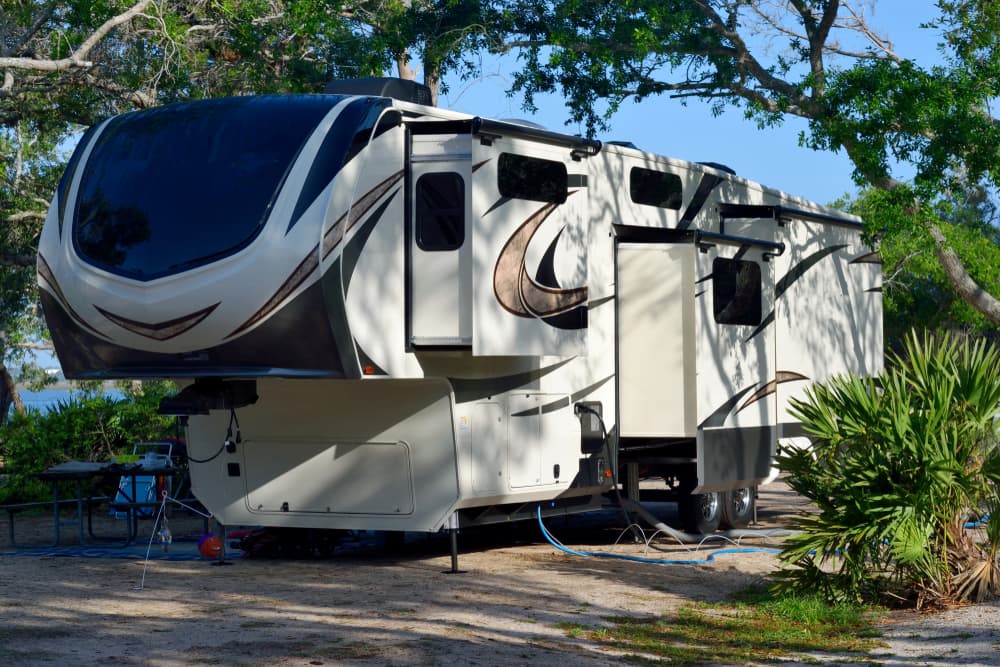
If you love having a good time during the summer, a Recreational Vehicle (RV) can regain your groove. Whether it’s a campervan, class A motorhome, or wheel trailer, it’s the right vehicle for camping or enjoying a road trip with family and friends.
Unfortunately, a defective recreational vehicle can disrupt your travel plans. For instance, an RV motorhome with a persistent transmission problem will most likely fail to engage gears or shake during gear shifts making it unsuitable for road trips.
When the above happens ahead of a road trip, you’re left with two options—cancel your summer plans or hire an alternative RV, an expense that might break the banks of your budget.
A disrupted summer trip is not an isolated incident; a defective recreational vehicle will always fall short when you need it most.
Fortunately, California Lemon Laws cover new and used recreational vehicles with the manufacturer’s new vehicle warranty. If you’re frustrated by an RV with persistent defects, consult an experienced California lemon law attorney on how to make a claim.
RV lemon laws protect consumers who buy or lease new or used vehicles with substantial defects. Regarding RVs, lemon law protects new and used cars—chassis, chassis cab, and drive train of a motorhome— with the manufacturer’s new warranty.
California lemon laws don’t restrict the use of vehicles. You’re therefore protected whether you use the car for commercial, personal, family, or household reasons.
More importantly, if the manufacturer or dealer can’t repair a substantial defect in your vehicle after “a reasonable number of attempts,” the manufacturer must either:

RV lemon laws apply when a manufacturer has made a reasonable number of repair attempts to fix a vehicle defect— often referred to as Lemon Law Presumption. Generally, no set number stipulates a reasonable number of attempts.
However, the following guidelines offered by Lemon Law Presumption determine if a manufacturer has made a reasonable number of repair attempts to fix the vehicle:
Lemon Law Presumption applies if the following considerations are valid:
If your car spends more time in the repair shop than on the road, you know you have a problem. California Lemon Laws protect you when your recreational vehicle is defective and the manufacturer can’t repair it after several attempts.
More importantly, lemon laws protect owners of defective RVs who buy or lease them in California and are still under the manufacturer’s new vehicle warranty.
The law provides that a manufacturer or a dealer must rectify a defect within 30 days after a consumer notifies them through certified mail. If the manufacturer cannot repair the defect after a reasonable number of attempts, the consumer is entitled to a refund or replacement.
Therefore, if you suspect your vehicle is a lemon after a dealer tries to fix the defect after two or more attempts, you should notify the manufacturer immediately. You don’t have to wait until the vehicle has been in the repair shop for over 30 days.
If you haven’t notified a manufacturer and you think your car meets the definition of a lemon, send a letter to the manufacturer with the following details:
The manufacturer has 30 days to fix the defect. Usually, they can authorize the dealer to make the repairs. When manufacturers receive numerous but related complaints, they issue recalls. Lastly, if none of the above happens, request a Lemon Law attorney to guide you on how to file a claim.
The Song-Beverly Consumer Act protects buyers who buy defective vehicles; however, they must prove that their vehicles are lemons according to set guidelines.
California Lemon laws cover vehicles with significant defects that substantially impact the vehicle’s use, value, and safety.
Here’s a breakdown of defects covered by Lemon laws according to the vehicle’s impact.
A vehicle’s defect can significantly alter its value, making it a lemon. Usually, the value of a car is influenced by its condition, age, mileage, maintenance records, versatility, and market demand, among other factors.
A defective RV raises concerns about the vehicle’s reliability, repair costs, and safety, contributing to the reduced value.
Here’s how a vehicle’s malfunction affects its value:
Vehicle defects and safety issues can affect any part of a recreational motorhome. Any malfunction that makes the driver or vehicle less secure qualifies as a substantial safety impairment.
Most safety defects put the driver and passengers at risk of severe injury or death.
Some of the common safety defects of an RV include:
A defective part in an RV impairs its use somehow, and it doesn’t have to be completely undrivable. Most people buy RVs to enhance their fun during holidays and on weekends. Therefore, if a transmission defect makes driving the vehicle for long distances impossible, you can no longer rely on it for road trips or interstate camping.
The transmission defect has impaired the expected purpose of the vehicle, even though you can drive the car just fine.
RV lemon laws cover consumers who buy vehicles with persistent problems. While most defects are protected under lemon laws, there are some exceptions to the rules:

You may be entitled to a refund or replacement under California Lemon Laws if you bought a defective RV with a new manufacturer warranty. However, you must understand the steps to claim your rights under the lemon laws.
Below are the steps involved in filing a lemon law claim.
If your RV develops a problem, immediately bring it to a dealer or manufacturer’s attention. Many consumers need to pay more attention to this step, which may worsen the defect or void your lemon law rights if ignored.
Remember, a manufacturer can only repair a defect they are aware of.
As much as Lemon Law protects consumers, it also gives them a duty to notify a manufacturer about the defect. Once the manufacturer becomes aware of the problem, it gives them an opportunity— a reasonable number of repair attempts — to repair the defect.
Taking your vehicle to an authorized dealership is always advisable because an independent repair shop puts your lemon law rights at risk.
The success of any legal claim, including lemon law claims, depends on the strength of the evidence presented. Therefore, before you file a claim, ensure you’ve gathered all the necessary documentation.
Here are the documents you’ll need to collect:
The repair order serves as a paper trail for all the defects in your vehicle and the repair attempts to fix the fault.
You’ll need to discuss your case with a lemon law attorney. While finding the necessary paperwork online is easy, it doesn’t mean you should go ahead and file the claim on your own.
Most consumers attempting to file a claim independently are soon overwhelmed. They’re equally confused when a dealer or manufacturer tries to take advantage of them.
On the contrary, working with an attorney has numerous advantages. For instance, the lawyer will handle all the legal aspects of the claim. In addition, a lemon law attorney will represent your interest during negotiations and mount a fact-based defense against the manufacturer.
While filing a claim, your warranty doesn’t need to be current. Lemon laws apply to defective RVs that were repaired under warranty. With that in mind, you can file a lemon law claim even if your warranty has expired.
Upon receiving the manufacturer’s first offer, the attorney will help you evaluate its suitability. It’s the attorney’s role to negotiate a better payout from the manufacturer. The manufacturer will settle if the negotiations bear fruit and both parties are satisfied.
Interestingly, most cases settle without trial; however, a lemon law attorney is always ready to represent you if the manufacturer fails to pay.
If a manufacturer refuses to settle after you’ve complained, it’s within your right to proceed to trial. In addition, if the offer doesn’t fully cover the purchase price, legal fees, and incidental costs, you can seek the court’s intervention.
Generally, a trial is time-consuming and complex. You’ll therefore need the help of an experienced lemon law attorney to navigate the process.
Lemon law claims are complex, time-consuming, and detail-oriented. In addition, you’re looking for maximum compensation for your RV that didn’t serve you well. A slip-up in the claim process will yield a low offer compounding the inconvenience and pain you endured with the defective unit.
Fortunately, working with a lemon law attorney will offer guidance, legal support, and direction on your journey to compensation.
Here are the benefits of calling a lemon law attorney.
When confronted with a defective vehicle, consumers need clarification about their rights, where to report, who to call, and their next course of action. Fortunately, you can find answers to the above questions with a simple call to a lemon law attorney.
On listening to your complaint about the defective RV, a lemon law attorney can offer a preliminary determination of whether you have a case against a manufacturer. Subsequently, you can rely on the attorney’s guidance on how to proceed with the matter.
Consumers stand very little chance against giant automakers. However, working with a lemon lawyer increases their chances of success. A lawyer can help you prepare for a claim if you inform them of the vehicle’s defect a few months before filing a lemon law claim.
A lawyer is also adequately knowledgeable about interpreting the California Lemon Law presumption and determining if it’s time to file a lemon law claim.
A stronger lemon law case helps you maximize the final payout of a lemon law buyback. A lawyer knows the best approach to a claim for an enhanced outcome. Equally, an attorney will help you gather enough evidence and documentation to support your claim.
You’ll also need a lawyer on your side during negotiations. Usually, automakers engage the best attorneys in the business to prepare a defense against consumers, which can put you at a disadvantage.
The role of a lemon law attorney during negotiations is to counter any claims by the manufacturer that affects your interest. Ultimately, having professional work on your case will undoubtedly strengthen your case.
Most lemon law attorneys work on a contingency—commission— basis. They’re, therefore, willing to take up a case without requesting an upfront fee. The commission-based approach motivates the lemon law attorneys to push for the best possible outcome.
Equally, California lemon laws require automakers to refund consumers the attorney fees incurred while pursuing a refund or replacement— if a consumer wins the case.
A Lemon Law claim can take up to 6 months to settle. Much effort is required to get everything in order; filing the claim, court appearance, appeals, correspondence with the manufacturer, and processing paperwork.
Handling the claim alone can be a source of stress and distraction from your work, school, or family life. However, once you secure a lawyer, you can leave the rest in the hands of a professional.
You’ll only be required to provide the necessary documents or consent at the latter stages.
Besides ruining your travel plans, a defective recreational vehicle impacts the vehicle’s safety endangering you and other vehicle occupants. If the defect is the cause of an accident, you may be called upon to pay medical expenses and damages to the victims.
To that end, your lemon law claim deserves the best representation that will aggressively represent your interest.
At LemonLaw123, our highly experienced lead attorney Valerie. G Campbell has a 99% success rate, which gives us an edge while fighting for our clients.
Contact us online or call us at 657.529.5239 for a free case review.
Valerie G. Fernandez Campbell, known as The Lemon Law Lady, has dedicated her entire legal career to the specialized field of Lemon Law, a journey that began immediately after her
graduation from UCLA School of Law.
With a 99% success rate and a policy of no fees unless you win, her practice stands as a testament to her expertise in California’s Lemon Law, her commitment to her clients, and her unwavering dedication to justice and consumer rights.